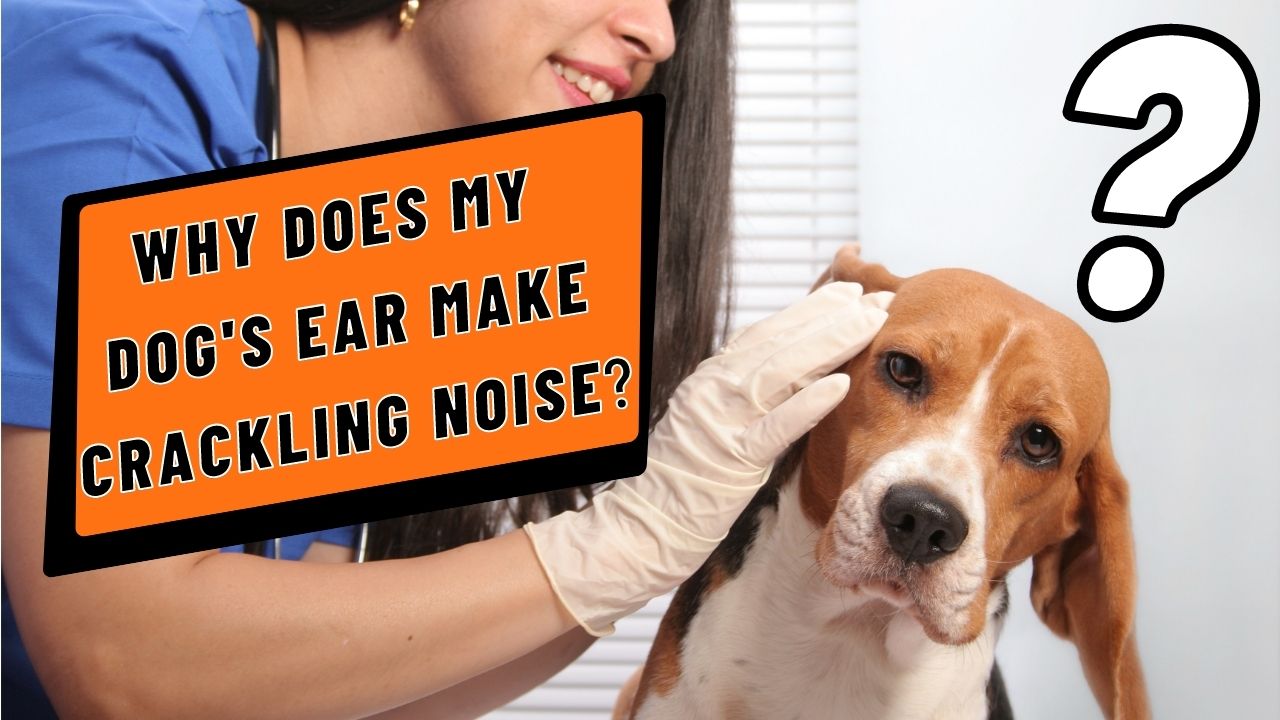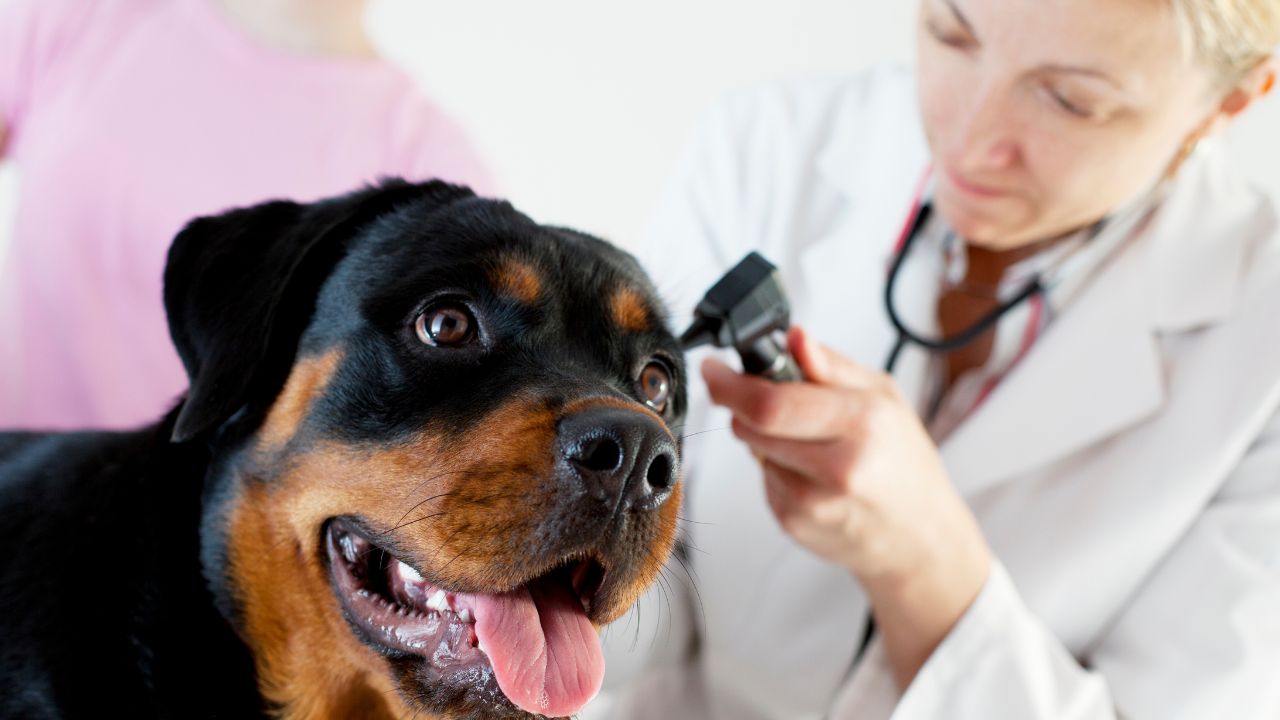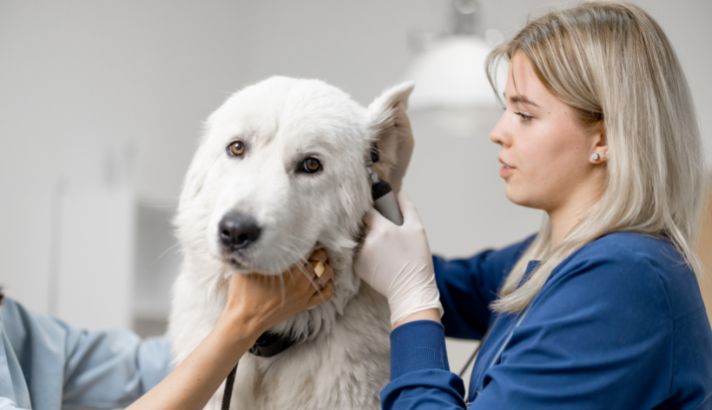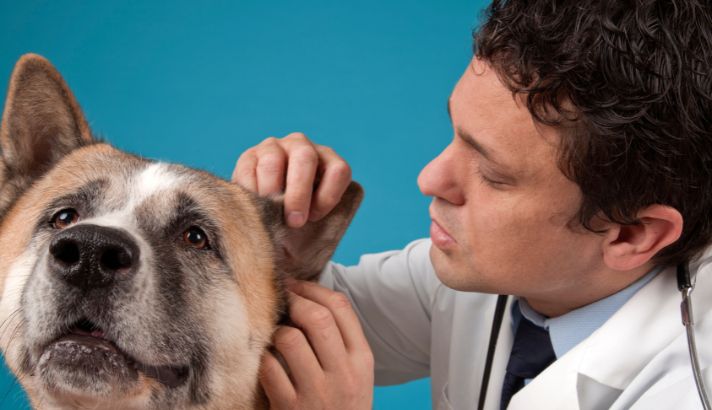
Why does my dog’s ear make a cracking noise? This can be alarming if you’ve never heard your dog’s ear crackle before and don’t know what to do about it. Luckily, if your dog’s ear does indeed make a crackling sound, several reasons might explain it. Whether it’s caused by allergies or an ear infection, an insect infestation, or some other issue, these 10 reasons why your dog’s ears might be making noises will help you figure out what the problem is so that you can treat it accordingly.
1. Flap out of place
Your dog may experience this issue if its ear flap is out of place. This can result in hearing difficulties and pain. The best way to fix this is to clean the area, remove debris or wax, and gently push the flap back into place. This should help with any ear pain your pup may be experiencing and improve their hearing ability.
2. Infected
#1. The ear canal can become clogged with earwax, which causes the eardrum to bulge out of place and make a crackling noise.
#2. If the eardrum is not intact or has ruptured, it will cause air to move around inside the ear canal, creating that crackling sound.
#3. If your dog has an infection in the ear canal like otitis externa (Swimmers Ear), he may experience pain and discharge from his ears that can clog the ear canal and make this sound as well.
3. Yeast infection
It may be a yeast infection caused by an overgrowth of the yeast fungus. Yeast has been shown to survive in moist environments, so the ear canal can be a prime breeding ground for yeast. All you need is some food for the yeast to feed on and conditions that are too moist or warm, and you’ve got yourself an infection. Symptoms of a yeast infection include irritation, itching, odor, and pain when your dog scratches his ears. The problem with this type of ear infection is that it can also cause otitis externa, inflammation of the outer ear canal tissue.

4. Mites
Mites are arachnids that burrow in the ear canal and cause severe itching. The most common mite to infect dogs is Otodectes cynotis or ear mange. Mites are tiny and difficult to see with the naked eye, but they can be seen by magnifying glass or microscope. Occasionally, mites enter the ear through ruptured skin around the ear canal caused by excessive scratching. When examining your dog’s ears, you should look for dark spots on the skin of its outer ear canal. These dark spots are most likely due to dried blood from scratches caused by mites moving around in the ears.
5. Infections
If your dog has an ear infection, it could be causing its ears to make a crackling noise. They may also shake their head, scratch at the ear, or have trouble hearing. You can tell if your dog has an ear infection by looking for signs of excessive wax and debris, redness, swelling, and discharge in or around the ear canal. Some breeds are more prone to infections than others as well. For example, Bull Terriers are prone to skin allergies that can cause inflammation of the ears. If you notice any of these symptoms in your pup, consult with your vet right away!
6. Tumors/tissues abnormalities
There are many reasons why your dog might have an abnormal ear noise. One of the most common is a tumor or tissue abnormality. Fortunately, these can often be surgically removed, giving your pup relief and returning his hearing. Tumors are usually benign, but in rare cases, they may not be. Their veterinarian should examine dogs with tumors as soon as possible for proper diagnosis and treatment options.
Cracking sounds in the ear could also come from an infection or blockage of some kind, such as that caused by excessive wax buildup. This is more common in breeds with floppy ears, like Bloodhounds and Basset Hounds, because they tend to accumulate more debris due to the contours of their ears.
7. Aural hematoma
An aural hematoma is an accumulation of blood in the tissues just behind the ear, which can create a crackling or popping noise when the head and neck are moved. It’s usually caused by trauma to the head that causes blood vessels to break. Other possible causes of an aural hematoma include: -The immune system attacking tissue behind the ear (autoimmune hemolytic anemia). -Viral infection with swelling of lymph nodes in front of and behind the ear (cat scratch disease). -Injury to one or both of your dog’s ears results in bleeding behind one or both ears.
8. Deafness
The sound of your dog’s ears making a crackling noise could be caused by deafness. This is typically seen in older dogs, but not always. Deafness can cause significant hearing loss, making it difficult for them to hear and respond to your commands. It may also result in behavioral changes such as fearfulness or aggression. If your dog has been having trouble with its ear(s) recently, have them checked out by its veterinarian as soon as possible.

9) Undersized cartilage
The ears are filled with small pockets of air called ear canals. The ear canal is lined with a thin layer of skin and cartilage that helps protect the eardrum. In some pets, this cartilage may not develop properly, leading to fluid buildup in the ear canal. This fluid buildup can cause the ear to pop or crackle when the pet moves or shakes its head.
10) Old Age
As your dog ages, its cartilage starts to break down, and the tissue surrounding the ear canal becomes thinner. This causes the ear canal to narrow, which leads to a buildup of ear wax and other debris. This can cause pain, infections, and hearing loss. Older dogs are also more prone to skin cancer in their ears, which can lead to disfigurement and bleeding from this area.
If you notice these symptoms in your dog, talk with your veterinarian about getting an exam to find out what is happening inside the ear before it gets worse. Your veterinarian may prescribe antibiotics or surgery as needed.
11. Allergies
Allergies are one of many common reasons why your pet’s ears may start to produce an odd and uncomfortable sound. Allergy-related issues can be very stressful for both you and your pet, so make sure that you consult with your veterinarian to ensure that it’s not caused by something more serious. Take care of any allergic reactions right away. Suppose you notice redness in either or both ears, excessive scratching, or unusual discharge from your pet’s ear canal. In that case, he might have developed an allergic reaction to something in his environment.
12. Hair growing into the canal
If your pet has long hair and regularly shakes it around, it can get stuck in its ears. When that happens, you may hear an abnormal cracking sound when your pet shakes its head. The best thing to do is trim back any excess hair to minimize snagging.
13. Caused by mites
Ear mites are tiny parasites that feed on dead skin cells in a dog’s ears. The first sign of an ear mite infestation can be when you hear clicking noises inside your dog’s ears. Other common symptoms include excessive head shaking, scratching, and itchiness around their ears. While these little bugs aren’t dangerous for dogs, they can cause intense itching (which may lead to infections) and irritation to sensitive or injured ears.
This happens more often with long-haired breeds of dogs. The best solution for removing it is to trim your pet’s fur near their ears so there isn’t as much excess hair that makes its way into their ears between grooming sessions. If you’re not comfortable clipping your own pet’s fur, take them to a professional groomer or vet for regular grooming sessions. If you choose to cut it yourself, use sharp scissors that are well-maintained, and be careful not to nick your pet’s skin or poke them in any other way when clipping near their head.
14. Broken tooth or damaged jaw
A broken tooth or damaged jaw can cause ear problems for your dog. A cracked tooth might lead to an infection in the mouth that could eventually affect the ear canal. A damaged jaw might mean that your pet cannot chew and swallow normally, which could lead to complications with digestion. If you notice any of these signs, it is essential to take your pet to the vet as soon as possible to get relief from their pain.

15. Wax buildup in the ear canal
One of the common reasons your dog’s ear makes a crackling noise is if there is a wax buildup in the ear canal. This can also indicate that your dog has some infection or fungus.
It would help if you first cleaned their ears as best as you could with cotton balls and warm water. You may need to do this multiple times over two days, so don’t give up.
If, after two days, your dog still has wax buildup, you’ll want to talk with your vet about what the next steps are going to be. They may recommend using drops or surgery if they think it will help resolve the issue and eliminate any underlying problems that might be causing it.
16. Foreign object stuck in the ear
CAID is an immunological disorder caused by a puppy born through the caesarian section. Exposure to bacteria at birth can develop antibodies, which will then attack the ear and cause it to make a cracking noise. This condition can be challenging to diagnose as it shares many symptoms with other ear infections and hearing problems.
CAID is caused by exposure to bacteria at birth, which leads to antibodies developing that will attack the ears and cause them to make a crackling noise. This condition is challenging to diagnose as it shares many symptoms with other ear infections and hearing problems.
17. Lip Fold Pyoderma in Dogs (LFP), aka Cotton Wool Disease
Lip Fold Pyoderma is the name for an infection on the inside of the ear flap or fold. You can tell if your dog has LFP because it will have a wet, crusty discharge, and its ear will crackle when touched. This is due to excess moisture in the inner ear that causes swelling and irritation. One way you may be able to tell if your dog has LFP is if its ears smell like yeast or cheese.
Lip Fold Pyoderma may be caused by an overgrowth of bacteria or yeast on the skin in that area. You can take your pet to see a vet, who will give them antibiotics and anti-yeast medications to clear up the infection.

18. Canine Acoustic Immune Deficiency (CAID), aka Cancerian Puppy Syndrome (CSS)
A dog’s ear can crack due to Canine Acoustic Immune Deficiency (CAID), also known as Cancerian Puppy Syndrome (CSS). CAID is caused by an impaired immune system and usually occurs in dogs that have been through several stressful events. It is most common in puppies with no antibodies from their mother, but it can also occur in older dogs with compromised immune systems. The infection can affect either one or both ears or only one ear. The most frequent signs of CAID are constant scratching of the ear canal with black discharge.
19. Caused by dryness in the winter air
With winter right around the corner, many of us will start noticing how dry air can make our skin and hair feel uncomfortable. We do what we can to keep ourselves hydrated and well moisturized by drinking water and applying lotion, but did you know that dogs’ ears require special attention? Dry air can cause their ears to become even more dehydrated than ours, which may lead to excess amounts of wax or other materials blocking up inside them. To keep your pet comfortable during cold seasons, it’s wise to avoid letting their ears get too dry by checking on them from time to time.
20. Caused by changes in barometric pressure or altitude (rare but possible cause).
You may notice his ears popping if you’re traveling with your dog. For example, this can occur if the pressure changes suddenly in an airplane or car. These rapid changes in air pressure cause tiny air bubbles to form in his middle ear space, which may make a popping sound. If it happens more often than not when traveling and doesn’t improve after treatment, talk to your veterinarian about a further diagnosis.

